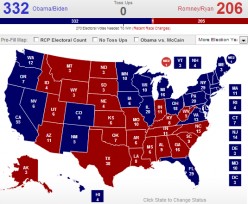Could the USA drop the Electoral College?
"A constitutional amendment, which requires a two-thirds vote in both houses of Congress (or a Convention under Article V of the Constitution) and ratification in three-fourths of all fifty states, would be required." - https://petitions.whitehouse.gov/petiti … e/GZQtFSPV
Check out the interactive map :
http://www.270towin.com/
Do you agree with the following statement?
"Our system for electing a president has worked pretty well. There is no real case being made that it will work better if changed only that it will look nicer if one subscribes to one particular vision of how democracies should work. We are so accustomed to stable, generally good government that we sometimes forget that failure of government structures is historically much more common than success. [W]e tinker with our success at our peril.
Bradley A. Smith, former Chairman,
Federal Election Commission
poll:
Keep the EC?
or
Drop it?
Bayh-Celler Amendment tried to abolish the Electoral College during the 91st Congress(1969-71)Dump the electoral college. Any good Liberal should be on the bandwagon for that, it is mind boggling that a popular vote does not elect the PUSA, that the actual election of the PUSA could be decided instead by the electoral college folks, which is now clearly and openly and publicly subject to being bought and sold and politically directed is an affront to the furtherance of Democracy across the World. The vast majority of the geography of the USA is right now this minute against Obama -- but the population centers which rely on his Democratic largesse are greater in number, and thus greater in electoral votes. So - - are we telling America, sit on your But in your neighborhood, don't bother to seek out opportunity in the UsA -- cause you can keep sitting on your butt in highly populated States and just not ever do anything else and still barbecue those steaks on the 4th of July? No sweat on the brow? No worry? Just breathe>>>>>>>>>>>>>>>>>>>>>
Again, Red states are the poorest with the highest concentrations of welfare dependents and liberals are on average wealthier by 6 to 7% (mainly due to higher education rates) not only that but every single Red state except for Texas costs more than it produces for the country and lives off the wealth of Blue states.
It's not a question of whether our election process would work better or if it works pretty well now. The question is: Should the people be allowed to directly vote for their candidate or should a body of unelected people do the deciding for us?
If you subscribe to democracy and believe that the United States is a democracy, then the choice is clear: Abolish the Electoral College. If you still believe in the Republic, and believe that the people should not have the authority to unilaterally and directly elect their own representatives, then the Electoral College should remain in place.
There are no other choices that need be considered. You cannot be for democracy and be in favor of keeping the EC. The two ideas are mutually exclusive. However, understand that directly voting for our government officials was NEVER part of the founding father's plans for this nation. It was set up this way for a reason, and if you believe that their vision was a good one then you shouldn't be messing around with a fundamental issue like how our leaders are chosen.
I am not advocating either way, but you should understand what you are supporting no matter which side you're on.They had a great vision but that was before electronics and high speed communications. We could vote on our iphones or at the library along with write in votes and early balloting and the old fashioned way for those without computers.
realtime voting results while the voting is still going on would encourage people to voting for their losing choice to tip the scales. As it is, east coast votes and if you know that you state is mostly the other choice - people don't vote because it's already "all over".
I already voted with an early mail-in ballot. I rather vote and take my time than to be hurried at a booth that only give you five minutes - even when there is nobody behind you waiting.
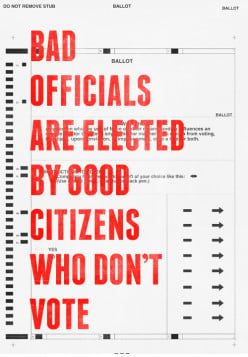

Keep the EC. It serves the purpose for which it was created.
QAnd the purpose was to make the government more stable by taking the popular vote out of the hands of the people?
So you agree that to eliminate the Electoral College would be tyranny of the majority? How is that better than tyranny of Florida retirees?No, that isn't the reason. If we do away with EC the National elections would be decided by those on the East and West coast. Larger populations would rule, leave the Constitution alone!
So we should have never screwed with the constitution when it came to slavery or females voting?
US gov't screws with the constitution all the time - without the people voting about it at all. Right now the US can arrest a US citizen in the US without charge or notification of kin - they disappear - and it's 'legal'. Your precious constitution has already been raped, rode hard and put up wet.
And how is being decided by Florida every four years an improvement from East/West coasts? There is more than one way to have a Weighted Voting System.
http://web.math.princeton.edu/math_aliv … index.html
BTW, the past 4 years has had more presidential directives than all others since 1776 - that's a dictatorship.
http://www.heritage.org/research/report … directives
“I believe there are more instances of abridgment of the freedom of the people by gradual and silent encroachments than violent and sudden usurpations.” — James Madison
Hi, ptosis.
Most credible posters in these forums take the time to fact check their own posts. You made the statement above that is totally untrue. Apparently, you did not read the paper you linked to support your erroneous claim.
Allow me to respond to your two claims using quotes from your own 2001 Heritage Foundation source: {1}
More presidential directives in four years than the total since 1776?
Not true!
Since Abraham Lincoln in 1862, there have been approximately 13,200 executive orders issued. Here is the recap of presidential directives for just the last 13 presidents:
Franklin D. Roosevelt Total 3,522
Harry S. Truman Total 907
Dwight D. Eisenhower Total 484
John F. Kennedy Total 214
Lyndon B. Johnson Total 325
Richard Nixon Total 346
Gerald R. Ford Total 169
Jimmy Carter Total 320
Ronald Reagan Total 381
George Bush Total 166
William J. Clinton Total 364
George W. Bush Total 291
Barack Obama Total 138
Please follow your own link to learn there have not been more presidential directives in four years than the total since 1776!
that's a dictatorship?
Not true!
“Because we would not expect or want the President to limit himself solely to oral instructions and declarations, it is not surprising that every President has used written directives to run the executive branch of government… As the foregoing discussion suggests, there are many legitimate uses of presidential directives…
“For over 100 years, the President has asked the Attorney General or another senior official in the Department of Justice to review draft executive orders and proclamations with regard to their form and legality…
“It would be a mistake to conclude that the number of executive orders or proclamations is a reliable indicator of whether a particular President has abused his executive order authority…
“In fact, a more careful review of executive orders suggests no correlation between the overall number of executive orders issued and the legitimacy of individual orders.”There are only four cases in our history where the candidate with the plurality of the popular vote did not carry the Electoral College too. All elections, except one decided by the Supreme Court in 2000 and one determined by the House of Representatives in 1824, were the result of the sum total of electoral votes for each candidate. The outcome in 2000 and 2004 could have been changed with a flip by any state in Bush’s column regardless of what occurred in Florida.
Thank you for posting such challenging comments. They are interesting if not factual.
Q.
{1} http://www.heritage.org/research/report … directivesThanks for pointing out my errors. You are right I didn't fact check and apologize.

Many recent ones are classified. -http://www.loc.gov/rr/news/directives.html
In accordance with this PPD non-disclosure policy, the Department of State last month denied a FOIA request from Gavin Baker of OMB Watch for a copy of PPD 6 on global development policy. The document was exempt from release, the State Department said, based on "the Presidential communication privilege." - http://www.911truth.org/article.php?sto … 1163707403
Here's one from 2012 that isn't > http://www.whitehouse.gov/the-press-off … eparednessI appreciate your providing additional information. Thank you, ptosis. ^5
Q.
Yeah, the popular votes were much, much closer. With Obama at 50% and Romney at 48%.
Pretty sad, that to win the presidency, you only need 50% approval rate of people who actually bothered to vote.
50% of the people who voted, voted Obama. ~50% of those registered to vote, actually voted. ~80% of people eligible to register to vote, are actually registered...that's like, 1/5th of Americans actually voting for Obama...right? (I'm not too good at fractions).I have mentioned this in other threads, but Obama actually got a higher percentage of the popular vote than both Clinton and Bush did when they were elected.
Also, historically, the estimated 57 percent of American voters who did vote would be the highest in 40 years.
My point isn't that we're not gridlocked. My point is that we have ALWAYS been gridlocked and that voter apathy has always been rampant.I don't care if it's "better," 50% is still a failing grade, in my opinion. Obama's approval rate may be "better" than others in the past, however, again 50% is still pretty pathetic. I wish we would have more agreement, because in this case, the other 50% of the voters, and what they wanted, have not been represented.
The presidency should have won with more than the votes of ~20% of Americans. That's what I think. People have the right not to vote, but I think it's pretty sad that such a high a number doesn't bother to vote, yet they live their lives under the decisions made by our leaders.High turnout always favors the left anyway, primarily because of the youth vote, countries that have passed compulsory voting saw leftwards shifts of an average 4% to 6%, voting is harder for the poor without cars etc. also.
Unless its absentee. WA is all-absentee voting. They mail it to you ahead of time, you mostmark it by election day. I don't see why the rest of the country hasn't done that... The only fair way to reach out to ALL citizens is to make it available where they are (in their home).
I don't see why voting isn't a process done over the course of, say, two weeks. It is stupid to think that ALL Americans can get time off to wait in line for hours at a polling location, and do it by 8pm, on ONE DAY out of the year.
Also, the the university I graduated from had ballot PRINT OUT stations in the library, for free, so students could get ballots, fill 'em out, and put them in a drop box on campus. How cool is that?!Nope regardless of who it is the higher the turnout broadly speaking the higher the leftist vote (inspirational candidates aside).
"Nope" in regards to what? How would the things I suggest *not* increas voter turn-out?
It doesn't really matter to me that it statistically skews left; I would be glad to see MORE people having a say in a presidential election than ~50%.More people voting is great all i was pointing out is it would not have changed the result of this election so it's largely irrelevant in this case.
There is no way to determine if it would have changed.
My main point was that the results were pathetic and not an accurate representation of the country, because, well, half the people didn't bother to vote.
1. What if you are homeless?
2. If everyone hasn't had a chance to vote, they extend the polling hours1. Then you can print your ballot out a the library.
How many homeless people do you honestly think vote?
2. The polls are closed, and not everyone has voted
That's not the point.....
If you are homeless, and ballots are sent to your home as you suggest, then they cannot vote.
If you are homeless, what if you don't know how to use a computer or are afraid to go into a library because you are afraid that people are going to kick you out?
If there are lines at the polls, the polls stay open. They don't just close because its 8p.m.homeless sounds derogatory like calling people dying of cancer - cancer-ites or something. The motto is "I'm houseless but at home". Think of storm refugees in NJ - or other events outside the control of a person. Not all street people are dumb, don't give a crap, blitzed out on drinking or drugs. It's just that being treated as a untouchable tends to make the urban underclass go that way after awhile.
It's self evident what society wants, to remove visible homelessness because just the mere sight makes people who have more than nothing - uncomfortable.
Most folks are houseless for only a few months - then there is the hard-core minority who live on the streets for years refusing services. Why is that you may ask, the following is one answer.
"In the end, San Diego's program requires destitute, often disabled, persons and their families to forfeit all rights to privacy to qualify for life-sustaining government benefits. The government's interest in preventing fraud does not justify highly intrusive searches into what the Supreme Court has referred to as the "sanctity of a man's home" when there exist no grounds of suspicion.
A dissent by Judge Pregerson from the Ninth Circuit's decision not to allow the full court to rehear the case exposes the decision in all its disgrace:
"This case is nothing less than an attack on the poor. San Diego's program strips these individuals of their rights of privacy. These people who are already suffering from disabilities, loss of work, and other hardships must then suffer humiliation and further assaults on their dignity. This is especially atrocious in light of the fact that we do not require similar intrusions into the homes and lives of others who receive government entitlements. The government does not search through the closets and medicine cabinets of farmers receiving subsidies. They do not dig through the laundry baskets and garbage pails of real estate developers or radio broadcasters. The overwhelming majority of recipients of government benefits are not the poor, and yet this is the group we require to sacrifice their dignity and their right to privacy. This situation is shameful."
Indeed it is, and it is time our legal system stopped using a different Constitution, one less robust, less protective, and less inclusive, in cases involving poor people. - http://www.dmiblog.com/archives/2007/12 … s_one.html
Hi there, ptosis. Thank you for launching this thread.
The purpose of the EC is to stabilize the whole election process. It balances the principles of federalism, states' rights and equality while recognizing that federal power is derived from the people through their elected officials on the state level. It reduces the possibility of tyranny by the majority and gives a voice to populations in small states. Without the EC, the presidential election could be unfairly influenced by the nine states with over 50% of the population leaving little or no influence in those 25 states with a combined population of only 17% of the total nation. {1}
Personally, I do not think "tyranny of Florida retirees" even exists, but if it did, I might prefer it to tyranny of the Supreme Court!
Q.
{1} http://exploredia.com/population-of-us-states-2011/I think tyranny of Florida retirees does exist in the last few elections. Your textbook answer is what is taught in schools and may have been true at one time but is still an artifact of slavery with the 3/5 rule.
I just think it's time to change to another form other than electoral college because it is not working at it originally intended to be - an equalizer among states. We need a different paradigm. Britain is stable and it has run-off elections.
It used to be at one time that US president was the electoral winner and the second highest was the Veep. Now it's voting as a pair.
Why can't I vote for whoever and number 2 is the veep like it used to be?
Hi, ptosis. Thanks for your interesting comments.
Naturally, I have no desire to change your mind or to challenge your opinions. They are both yours and you are welcome to them. Fortunately, both slavery and the 3/5 rule are indeed artifacts and I say it is good to be rid of them. Also, I am amused by your characterization of the last few elections as a tyranny of Florida retirees. Trying to justify a tyranny of Florida retirees is the equivalent of declaring the 2012 presidential election a tyranny of independent or undecided voters. :lol:Yep! Thanks to the 12th Amendment. The states learned from history and changed the Constitution. Now you want to go back to the old way?
The Brits manage to accomplish in four weeks what takes a year of more to complete in America. Let’s not even talk about the difference in costs! A run off election is no big deal to them.
There is a lot about British electioneering to admire. It is swift and not overly burdened by raising money. Furthermore, spouses are not elevated to celebrity status and they manage to maintain their own individual lives outside the political arena. More importantly, the British electorate is well informed, engaged in the process, and civilized when dealing with differences of opinion. Even the candidates appear to be more natural and accessible.
On this side of the puddle, elections are a pathetic circus, painfully long, and disgracefully expensive. The public is bombarded with sound-bytes and TV attack ads. Campaigns are numbing spectacles dominated by high paid talking heads bent on creating a freak show just to boost ratings. So, you favor adding a run-off election to this horrific, idiotic display?
Since you asked the question in a public forum, permit me to toss my chip into the pot. One, the VP might not be the person you would want to finish the president’s term if he was unable to serve. Or, two, you might want the president to have a loyal VP to break a tie vote in the Senate. I think it has been working well just the way it is.
I guess the bottom line, ptosis, is we don’t always get to have things our own way. That is a blessing from living in a republic.
Q.
- JaxsonRaineposted 13 years ago
0
If Obama wins this election, It doesn't look like he'll win the popular vote.
Whether or not that's a good thing...I believe Al Gore got the majority of the popular vote when he was running for president and... of course did not win.
- HowardBThinameposted 13 years ago
0
The true popular vote is nothing short of mob rule.
We'll keep the EC - we need it. I think the EC is out of date; it was created before states were fully settled, so Western territories would have a fair say in the elections and in issues that concerened them. This prevented the East from dominating.
Obama won the electoral votes in my state prior to me even getting my ballot in the mail. Sure makes me feel like I have a choice (not).
I think the majority should win in the states, and if its close to 50/50, half the electoral votes should go to each. Then, the states can be weighed in correlation to their populations.There is a piece of legislature moving through the states whereby a state would give up its electoral votes to whomever wins the national popular vote. Half the needed number of states have already passed this option into state law.
The electoral college might have been necessary before the era of television, internet and all the devices of communication we have today. And what is wrong with the majority ruling? Isn't this America? One person. One vote. Sounds good to me.That's the major issue as I see it. From the time I was old enoung to understand what people were saying, I hear all the time about how democracy in the United States is important, about how we elect our leaders and about the "Will of the People"
We need to decide whether we are truly a democracy or if we're going to have an EC. We can't have it both ways. The nation was born a republic. If we want to become a democracy, then that's fine.... but that means getting rid of things like the EC. It means direct rule. It means the majority does get to decide things, even if they decide wrongly. The constitution still protects the minority from mob rule. You still need an overwhelming majority to change it AND the ratification by state and not by population.
Understand what you're talking about before you sound off. I hear a lot of people talking about how it would be more effective or less effective if we got rid of the EC. I don't hear anyone asking the important question: What kind of government do we want? Is democracy more than just a word to you? Is "one person one vote" more than just a slogan? Do you want your vote to really matter or are you content to let someone else cast it for you?
The E.C. was put in place when 1/2 of the American citizens weren't even considered a whole person. Only white MEN were thought of as a whole person worthy of casting a vote, and the majority of them couldn't even read, which is why they decided to let "educated" folks do the real voting instead....
It is old and out dated. It doesn't matter where in America you live or which state has more people. Every single American has the right for their voice to be heard. Every single American has a say in who they want to lead this country.
We have come a long way since the founding of our great nation. Counting every single vote would have been impossible back then. Through progress and technology, we now have the availability to make that a reality. Also, reading and writing are common place now. We have children in grade school who know more than the "educated" men selected for the first E.C.
Times change, the founding father's knew at least that much, which is why they gave flexibility to change those things which became out-dated in our government.... it is far past time to do away with the E.C.
I strongly believe that many more Americans would vote if they knew their vote actually counted. So many people don't because they know it doesn't matter anyway, the appointed person of their district gets to make the final call... I'm not sure how that's a democracy...
Majority rules, if you don't want to do away with the EC because you're afraid your party will loose to the majority that doesn't change the fact that we are a democracy & that's the way it is supposed to work. It sure as heck doesn't make it right.
It's our country, we should have the right to not only vote, but to have our vote actually mean something. The government is supposed to be FOR the people BY the people.... not just SOME of the people.I agree with you entirely and I personally know many people that are not even voting because they feel their vote does "not count" especially if they live in a predominantly red or blue state.
Good evening, Mom Kat.
I fully respect your right to have your own opinions about the Electoral College although some of the arguments offered to support your conclusions are clearly not accurate.
It is not clear what you mean when you say, “reading and writing are common place now. We have children in grade school who know more than the ‘educated’ men selected for the first E.C.” Perhaps you are unaware that the ordinary citizen in the American colonies of 1776 was the most literate and the best educated of the times. If you used quotation marks in your statement to imply the first electors in the Electoral College where poorly educated you would be wrong. The research of Columbia University’s Lawrence A. Cremin indicates that literacy among adult white males in Colonial America was between 70 and 100% compared with only 48 to 74 % in England. (1)
You go on to explain that the EC is not keeping up with progress and it no longer reflects the sentiments of the majority of the electorate. In your words, “It is old and out dated. It doesn't matter where in America you live or which state has more people. Every single American has the right for their voice to be heard. Every single American has a say in who they want to lead this country.”
What do Andrew Jackson (1824), Samuel J. Tilden (1876), Grover Cleveland (1888), and Al Gore (2000) have in common? After 220 years, 56 presidential election cycles, and 44 elected presidents, these four men are the ONLY candidates for President of the United States to win a plurality of the popular vote and to loose in the EC. {1} This 4-out-of-56 record clearly shows that the system is overwhelming effective in electing candidates not only favored by the majority of the nation’s population, but also favored by the majorities of the populations within the individual states. The EC strikes a brilliant balance between federalism, states’ rights and individual equality. To eliminate the EC to promote individual equality places the principles of federalism and state’s rights at risk when it is all three that make our republic unique. Actually, Kat, we do not live in a democracy. We live in a republic. We empower our federal government through our state’s elected officials. Americans who think their vote is not counted are grossly misinformed about the election process. Every vote counts. Each citizen needs to understand that NOT casting a ballot is a vote FOR a person who thinks differently than they do. Furthermore, saying, “the appointed person of their district gets to make the final call” is absolutely untrue. First of all, only two states divide their EC votes based on district results. In the remaining “winner take all” states the outcome is determined by the popular vote.
Each state has a number of electoral votes equal to the combined total of its congressional delegation. Each political party submits a slate of electors. When a citizen casts a ballot for a presidential candidate, that ballot is also a vote for the electors already selected by the party of that candidate. If a majority of voters in a state vote for the Republican candidate for President, the Republican slate of nominees is elected. If a majority vote for the Democratic candidate, the Democratic slate of nominees is chosen. Therefore, the Electoral Votes of each state are determined by the popular vote within each state.
So it seems, Kat, historians have established that citizens in Colonial America were comparatively better educated, albeit not with the same facts, than today’s grade school students. The Electoral College has an established record to refute claims that it does not represent the will of the majority of voters. Finally, Americans who feel disenfranchised by the EC process need to understand every vote is important in the big picture even those votes that that some choose not to cast.
It was refreshing to read about your opinions, Kat, and I thank you for sharing them with us. I learned from you.
Q.
{1} http://www.infoplease.com/ipa/A0781450.htmlI am confused by what you mean by this. Washington state is the only state I have been old enough to vote in, and in Washington you can vote for whomever you want. I voted about 60%R-40%D on the candidates on my ballot for various positions. I have heard that it is different in other states, that if you register as Republican...your vote goes to all the Republican candidates. Is this what you mean here?
Hello Kathleen.
No that is not what I mean. In a general election (not a primary) in all states, you may vote for anyone on the ballot regardless of your party registration. However, when you vote for the President of the US, you are also voting for his party’s roster of EC electors. Except in Nebraska and Maine, the presidential candidate receiving the plurality of votes, in effect, wins all of the states electoral votes.
Is it clear to you now? If not, you can try here for more info: http://www.infoplease.com/spot/campaign … z2AGXoLiiM
Q.
Good Evening Quilligrapher,
That was a very well worded and informative rebuttal to my statement.
The part I'm having a difficult time with is the standards of education and the level of reading and writing that they had in 1776. You're right, they weren't educated on the same things our youth is educated on today; nor did they have the same standards of equality and respect.
I say this because back then, women and any man who wasn't white, weren't thought of as citizens with full rights as everyone one is today.
Our education system is eons past where they were. Our understanding of human rights and equality would have gotten you hung or shot back then...
I just can't wrap my head around why we would still consider them to be so intelligent by today's standards when they couldn't possibly have been.
With all of the advancements we've made it just strikes me as odd that we wouldn't want to advance and update how we do things in all aspects of running our government of today for today's people.
Why still take a horse and buggy to get to where you want to go when we have cars?
Of course, I'm just a simple minded citizen who only graduated from a tech school instead of real college, so what do I know...
I do appreciate you taking the time to spell all of that out for me though, and I don't mean that sarcastically. Intelligence is always a good thing
Greetings, Mom Kat. I hope you are well this evening. I’m back to you to try to expand on my earlier post.
There is no single answer that applies to all of the issues you raise but let’s not loose sight of the main topic, the Electoral College.
You say one of the reasons why you favor the elimination of the EC is your belief that “the majority of them [white men circa 1776] couldn't even read.” To which you added, “Also, reading and writing are common place now.” It should not be hard to understand that nearly every ordinary white male in the 13 original colonies was highly literate. That is to say they had been formally educated and able to read and write. {1} Now, it is your stated perception that literacy skills in the US are superior today then in 1776 and this is a good reason to do away with the EC. Personally, I do not think literacy should be a factor in determining the fate of the Electoral College but if you do, that is okay. However, is your perception true? Apparently not according to the National Center for Education Statistics at the US Education Department.
I have no way of estimating what you call “standards of education” in 1776 yet there have been recent studies of literacy skills in the USA. The NCES conducted the National Assessment of Adult Literacy in 2003 to estimate the Prose, Document, and Quantitative English literacy skills of the nation's adults. The study found an estimated 14.5% of adults were lacking Basic Prose Literacy Skills and another 13.6 % were Below Basic in Prose Literacy. An amazing 28.1% of Americans struggled during the last decade with little or no basic literacy skills! {2} These studies focus on the quality of literacy. On the other hand, the CIA World Factbook defines literacy as just the ability to read and write at a specified age. Based on this simple definition, the USA ranks behind 21 other countries. {3}
If your only criteria for discarding the EC is a comparison of literacy skills in America in 1776 to today’s society, then you should consider retaining the EC for now.By adding “intelligence” to the mix, you have gone beyond the scope of my previous comments. So, I will just pass on this oneTo assert that it needs to be fixed when it is not broken is hardy valid. Your position is that the EC should be replaced for no other reason then its age. This perspective ignores the facts that it has functioned remarkable well for over 200 years, achieved all of the objectives for which it was created, and conformed to the sentiments of the majority of voters in 52 out of 56 elections. Furthermore, it is one of the last surviving vestiges of states’ rights while it also forces candidates to respect the needs and aspirations of Americans living in small states. The Electoral College may not be perfect but it is a brilliant invention and a crucial legacy left to us by the nation’s founding fathers.I would say simply because modern is not always better. Just ask the Amish!
Q.
{1} Lawrence A. Cremin, American Education: The Colonial Experience, NY: Harper & Row, 1970.
{2} http://nces.ed.gov/naal/estimates/overview.aspx#top
{3} http://www.indexmundi.com/g/r.aspx?c=xx&v=39Quilligrapher ~ thanks again for spelling everything out for me.
Being that this is not my area of expertise I don't have a whole lot to counter with. I simply stated my opinion and my feelings over the matter.
I didn't expect to get a lecture on the history of the Electoral College.
Silly me, I just thought I could voice my opinions and flex my right to free speech...
I never took debate or payed very much attention in history or social studies class, so I'm just going to go ahead and say "you win" because you're starting to make me feel like my thoughts and views are somehow invalid and not worthy of respect. I really don't like feeling that way, so I'm just going to keep my opinions to myself on this matter from now on.
Thanks for putting this woman back in her place. The forefathers would have been proud, I'm sure.
Have a great night & have fun educating everyone else on why their opinions don't matter either.Hi Mom Kat.
I am embarrassed by your take on my last post. Not once did I say your opinions did not matter. I apologize to you if my words conveyed the impression that I felt that way. I read in your previous post, “The part I'm having a difficult time with is the standards of education and the level of reading and writing that they had in 1776” and I mistakenly thought you were open to my expanding on my earlier comments. Obviously, I was wrong. I am truly sorry that it came across to you as a lecture and that something I said implied I was a sexist putting you in your place. It is obvious to me now that your comments were not an invitation to continue the discussion and, in fact, you had no interest in learning more about literacy in 1776. Furthermore, I acknowledge it is you who have put me in my place. Thank you.
Q.
I'm sorry, Quilligrapher but your argument invalidates your argument. If you are correct in your statement that the EC predominantly votes in accordance with the popular vote, then what do we need them for? It is an uneeded expense and an unwanted procedure.
The EC balances the power, and in doing so - protects the citizens.
First, we're not now, nor have we ever been a "democracy," instead, we're a constitutional republic, based on federalism. A true democracy is nothing more than mob rule.
The EC ensures that the little guy - states with small populations - have at least some say. Otherwise, the metropolitan areas would dominate the rest of the nation.
Plus, the EC prevents demagogues from being elected. Suppose there were five popular candidates and four were very popular, but one was pretty much a tyrant, and favored only by an extremist religious organization. Fully three-quarters of the population split their votes between the four popular candidates, but the other quarter - the radical minority votes all for the tyrant. The tyrant then becomes the President, even though he was voted in by a minority.
Our EC works just fine.No. It doesn't, As has been pointed out here, many states go one way or the other. All their delegates vote for a single party, and that point is often reached before the polls close (which means before people have stopped voting) This happens because the cities get their votes in before the rural areas. so the high population zones are getting their way even with the EC. If it's not fair for the popular vote, then why is it fair for the EC to do it? Mob rule might very well be a problem, but no one has made a successful case for it being worse than using the EC, and saying the EC works "just fine" is certainly NOT true.
Tinkering with the basic structures is risky and it is wise to do so rarely and with caution.
IMHO an erratic state is even worse than a static one.It's almost damn near impossible to change the constitution and if it happens then it's the people mandate. A static nation will always fail - it must be adaptable to survive.
The Romanovs ruled for 700 years - yet were toppled - ask them how a static gov't worked for them.
"On July 17, 1918, the last tsar of Russia Nicholas II Romanov - along with his family and servants were murdered in the basement of the Ipatiev house in Yekaterinburg, Russia." - http://www.squidoo.com/the-world-s-most … istory#_=_I am not saying static is good, just that erratic is worse.
IMHO what is broken could be fixed in other ways.Maybe. But we must adapt to the needs of society in order to survive. Already we are using rules written 200 years ago to cater to the needs and circumstances of people living at that time. What happens when we end up following rules written longer ago than that? 2000 years ago? Our nation doesn't follow the rules written in the Bible to the full extent, because those rules have become obsolete to society. Sure, there are some things in the Bible that can hold true to today, but those things are very minute compared to the influences the Bible had hundreds of years ago. Eventually, things written in our constitution may not be relevant to our society. Actually, I think that's already starting to happen.
I don't see how modern people differ from past people in a manner relevant to the pros and cons of an FPP electoral system.
Our electoral system was created when the Western states were just territories, and under-represented due to their small populations and lack of development compared to Eastern territories.
People differ today because the states are established, and well-populated. California has a huge chunk of electoral votes. The system was created when the population of the country was in the millions...now, people are being under-represented in their states, because they happen to live in a state with less densly-populated cities. Wyoming's interests may never be represented in an election. That is how the people are different (there are more people).You can change how many seats a state has and redraw electoral boundaries without going to any great lengths. It is done all the time and requires no actual changes the basics of the Electoral College.
Wyoming has a Representative per 530,000 people. That's actually one of the lowest ratios in the US, so you have a disproportionate advantage! Most states are at 700,000 or above.
So are you suggesting people in Wyoming should get even more of an advantage because they "count more" than people in big cities? I can't say that I agree. Government is for people, not land. That is the same now as it was back when there was a representative per 30,000 people.I don't have the answers for you. IF I did, perhaps I would be president.
All I am saying is lower-populated states are brushed over in the shadows of California, New York and Texas. Perhaps if their needs were more represented, they may be able to grow more and bring in more people.
The thing is, if 55% of my state votes for Obama, Obama gets all the electoral votes from my state. The rest of the 45% are not represented. I don't see why we couldn't count all votes, because even within state boundaries, the more populated area has an iron boot planted on top of the less populated areas. In my state (Washington), people on the East side are resentful of people on the West. Seattle dominates the electoral vote. The needs of the farmers over on the other side of the Cascades are not represented.I was asking on what basis you said people need something different now than from 100 years ago. And it seems they don't.
The pros and cons of FPP versus proportional representation are the same now as they have ever been. One is too stable, the other is too unstable.
How the US is run now is exasperating, what it would be like if it was run more like Italy or Israel is terrifying.So you're saying it would be a bad thing if everyone's votes were to be counted?
Fill me in; I do not see how representing the farmers on the East side of Washington would be a bad thing.Proportional systems lead to unstable coalition governments where freaky minor parties have hugely disproportionate power. So your interest group will most likely end up even worse off.
Keep in mind I actually support proportional systems, especially STV or MMP. My country changed to this system in 1992 and I voted in favor of doing it. But objectively speaking they have just as many problems as FFP, just different problems.
It would be far easier to do FFP better than replace it in a country like the US. The risks of extreme parties seizing power in a powerful nation are pretty horrific. And it would be vital for every citizen to know exactly how these things work before even entertaining the notion.
First off it would be wise to understand why the founding fathers chose FFP, it was not by accident. They wanted a government that erred on the side of inactivity--and for good reason.
Sorry, I can't stand it any more. <link snipped - no promotional links>
See what you think.
OK, throw out some ideas other than dropping the EC - I would like to know because if dropping the EC is out of the question. How to fix Presidential race so that it doesn't always go by whichever way Florida votes.
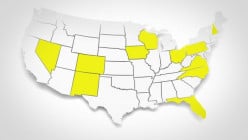
If the US became one country (do away with individual states) then yes, the EC is not needed. INdividual states tend to create issues.
One of the principles of democracy is majority rules. Therefore, it isn't as simple as "the person with the most votes wins." If the person with the most votes has less than 50%, they don't have a majority.
The proposed amendment in 1969 addressed this by including that a person with a plurality of votes of 40% or more would be declared the winner. Had that been the rule from the beginning, a couple of elections would have turned out differently.
In the first election in which people voted for President, Andrew Jackson would have become the President over John Quincy Adams, who made a backroom deal to get more than half the electoral votes. Jackson had more than 40% of the popular vote. Samuel Tilden would have been elected over Rutherford B. Hayes in 1876. Grover Cleveland would have been reelected over Benjamin Harrison in 1888. Finally, Al Gore would have been elected over George W. Bush in 2000.
There still would have been one election not determined by the popular vote, however. Abraham Lincoln would not have received enough votes in 1860 to become President.
In all, 19 elections have been won by people who did not receive a majority of the votes. The electoral college has resolved all but two of those elections as 17 of the 19 received a majority of electoral votes.
For whatever it's worth, it's at least something to think about. It has been effective in resolving pluralities into majorities sufficiently to preserve a basic tenet of democracy.Quite a few of you are forgetting one teeny, tiny, little fact here:
The U.S. is not now, nor has it ever been, a democracy. Think back to when you were all in school, remember that part in the Pledge of Allegiance: "And to the Republic for which it stands...", remember that?
We're a Republic guys & gals, not a democracy: we're governed by representatives, and "majority rules" does not apply.
Incidentally, for all of the "democracy" advocates out there: where do you think we'd be right now as a country if this were a "majority rules democracy"? Do you honestly think that in the 1860s (with no female and only 3/5 of free African-Americans) abolishing slavery ever even comes up for a vote, much less passes? Do you honestly think women get the vote in the 1920s? Just something to consider.While it is true that the United States is a representative republic, and not a democracy, the Constitution put into place a democratic principle for electing the President:
The person having the greatest number of votes for President, shall be the President, if such number be a majority of the whole number of Electors appointed; and if no person have such majority, then from the persons having the highest numbers not exceeding three on the list of those voted for as President, the House of Representatives shall choose immediately, by ballot, the President.
Even within the representative system, the democratic principle of majority rules prevails. In order for a bill to pass, a majority must vote for it. Representatives and Senators may vote for or against a bill, or they may abstain from voting. Abstentia does not change what a majority is. If 218 Representatives, or 51 Senators abstain from voting, the bill cannot pass even if all those voting vote in favor of it. If 50 Senators abstain from voting, the bill can only pass if all those voting vote in favor of it and the Vice President also votes in favor of it.
The claim that the United States is not a democracy is technically true because people do not directly vote on legislation. That is done by the representatives we elect to Congress. However, the democratic principle of "majority rules" plays into every election whether it be by the people, or by the people elected to represent the people.OK: Keep the EC but remove the "winner take all" rule as it is in the split states of Maine and Nebraska - so that all votes are counted and there is no 'mob rule'. If people felt that their vote counted then there would a higher voter turn-out.
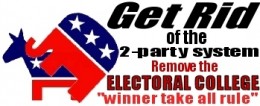
Get rid of the 2 party system - remove the electoral college "winner take all rule". It is not fair. the Dem/Rep don't want people to vote - they want to keep the system static. but a static system cannot adopt and the USA will become a dinosaur - extinct - if changes are not done now - will we fall as Rome did - and it won't take 400 years to do it either.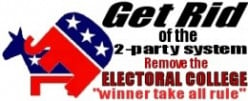
[img– With eight days to go until Election Day, a new survey indicates an extremely close race for Florida's 29 electoral votes
For those who love the EC - how do you feel about having a 269- 269 tie between Romney and Barack Obama? The fallback system hasn’t kicked in since 1824.
http://abcnews.go.com/Politics/OTUS/pot … JUokOpqB1Y
No matter how a person feels about the Electoral College, the rationale shouldn't have the unintended consequence of voter suppression.
http://www.washingtonpost.com/opinions/ … story.html
Myths:
The framers created the electoral college to protect small states.
The electoral college ensures that the winner has broad support.
The electoral college preserves stability in our political system by discouraging third parties
In direct elections, candidates would campaign only in large cities.
Electors must vote for the candidate who wins their state.
I cannot embed a video on the forums but the little girl is crying because of all the political ads on TV.
Her Mom says to comfort her:, "It'll soon be over"
'Tired of Bronco Bamma and Mitt Romney'
http://www.youtube.com/watch?v=OjrthOPLAKM
I think we all are tired of this crap. Hopefully there will be no electoral tie or it will really be the ApocalypseWell I am batting 100% wrong on the Florida thing,
"The only mystery left in the presidential election is Florida. Votes there are still too close to project a winner.
Ninety-seven percent of the vote has been counted and there is only a 45,000-vote difference between Gov. Mitt Romney and President Barack Obama of the total 8 million votes cast.
Whoever wins Florida won't make a difference. Even if Gov. Romney were to win, it would not nearly be enough for him to take over 270 electoral votes." - http://www.cbsnews.com/8301-18563_162-5 … ft-behind/
Related Discussions
- 236
The Electoral College
by Mike Russo 9 years ago
People are protesting President Elect Trump? Because Hillary won the popular vote by .3% Trump = 47.4%, Hillary = 47.7%, but she lost the electoral college. That means more people voted for Hillary's platform than for Trump's. The electoral college must go. It is outdated and was for a younger...
- 9
Should the USA go to popular vote instead of the electoral college?
by Eric Hubbard 14 years ago
Should the USA go to popular vote instead of the electoral college?
- 26
Do you believe the Presidential Election is rigged?
by ptosis 9 years ago
Do you believe the Presidential Election is rigged? Is the Electoral college system rigged? ‘More people are discovering that the system is all rigged and voting is just pacification,’ three-time presidential candidate Dr. Ron Paul argued during an interview with RT America. Paul warned that the...
- 78
Electoral College vs. Popular Vote
by Faith Reaper 8 years ago
I may be a bit naive on this topic, but I believe that my vote should count. I understand the history and all, but I still think one's vote should count, and the candidate who receives the most votes should win. What are your thoughts. Please help me to understand why the...
- 36
The Electoral College - State Voters Won't Count
by ga anderson 6 years ago
Let me channel Jake for a moment...BIG BREAKING NEWS! Bombshell announcement! A CONSTITUTIONAL crisis!Deleware has voted to join eleven other states in awarding their 3 electoral college votes to the national popular vote winner!The votes of state voters in these 12 states no longer matter! YOUR...
- 12
Why does the United States have an Electoral College?
by Michele Travis 13 years ago
Why does the United States have an Electoral College?Every 4 years, Americans vote for a president. After the people's votes are counted, one candidate is the winner in each state. Then that candidate wins all the state's 'electors'. The electors from each of the 50 states are counted up like...









